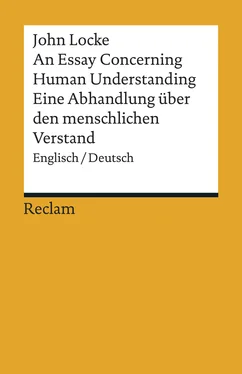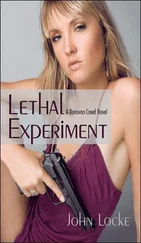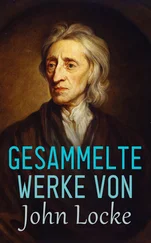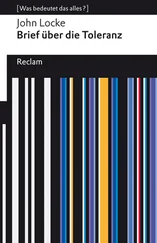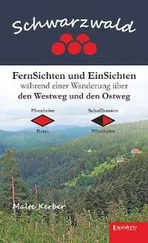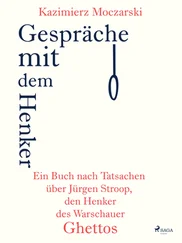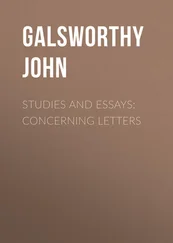§ 4. We must therefore consider wherein an Oak differs from a Mass of Matter, and that seems to me to be in this; that the one is only the Cohesion of Particles of Matter any how united, the other such a disposition of them as constitutes the parts of an Oak; and such an Organization of those parts, as is [322]fit to receive, and distribute nourishment, so as to continue, and frame the Wood, Bark, and Leaves, etc . of an Oak, in which consists the vegetable Life. That being then one Plant, which has such an Organization of Parts in one coherent Body, partaking of one Common Life, it continues to be the same Plant, as long as it partakes of the same Life, though that Life be communicated to new Particles of Matter vitally united to the living Plant, in a like continued Organization, conformable to that sort of Plants. […]
§ 5. The Case is not so much different in Brutes , but that any one may hence see what makes an Animal, and continues it the same. Something we have like this in Machines, and may serve to illustrate it. For Example, what is a Watch? ’Tis plain ’tis nothing but a fit Organization, or Construction of Parts, to a certain end, which, when a sufficient force is added to it, it is capable to attain. If we would suppose this Machine one continued Body, all whose organized Parts were repair’d, increas’d or diminish’d, by a constant Addition or Separation of insensible Parts, with one Common Life, we should have something very much like the Body of an Animal, with this difference, That in an Animal the fitness of the Organization, and the Motion wherein Life consists, begin together, the Motion coming from within; but in Machines the force, coming sensibly from without, is often away, when the Organ is in order, and well fitted to receive it.
§ 6. This also shews wherein the Identity of the same Man consists; viz . in nothing but a participation of the same [324]continued Life, by constantly fleeting Particles of Matter, in succession vitally united to the same organized Body. He that shall place the Identity of Man in any thing else, but like that of other Animals in one fitly organized Body taken in any one instant, and from thence continued under one Organization of Life in several successively fleeting Particles of Matter, united to it, will find it hard, to make an Embryo , one of Years, mad, and sober, the same Man, by any Supposition, that will not make it possible for Seth , Ismael , Socrates , Pilate , St. Austin , and Caesar Borgia to be the same Man. For if the Identity of Soul alone makes the same Man, and there be nothing in the Nature of Matter, why the same individual Spirit may not be united to different Bodies, it will be possible, that those Men, living in distant Ages, and of different Tempers, may have been the same Man: Which way of speaking must be from a very strange use of the Word Man , applied to an Idea , out of which Body and Shape is excluded: And that way of speaking would agree yet worse with the Notions of those Philosophers, who allow of Transmigration, and are of Opinion that the Souls of Men may, for their Miscarriages, be detruded into the Bodies of Beasts, as fit Habitations with Organs suited to the satisfaction of their Brutal Inclinations. But yet I think no body, could he be [326]sure that the Soul of Heliogabalus were in one of his Hogs, would yet say that Hog were a Man or Heliogabalus .
§ 7. ’Tis not therefore Unity of Substance that comprehends all sorts of Identity , or will determine it in every Case: But to conceive, and judge of it aright, we must consider what Idea the Word it is applied to stands for: It being one thing to be the same Substance , another the same Man , and a third the same Person , if Person , Man , and Substance , are three Names standing for three different Ideas […].
§ 8. An Animal is a living organized Body; and consequently, the same Animal, as we have observed, is the same continued Life communicated to different Particles of Matter, as they happen successively to be united to that organiz’d living Body. And whatever is talked of other definitions, ingenuous observation puts it past doubt, that the Idea in our Minds, of which the Sound Man in our Mouths is the Sign, is nothing else but of an Animal of such a certain Form: Since I think I may be confident, that whoever should see a Creature of his own Shape and Make, though it had no more reason all its Life, than a Cat or a Parrot , would call him still a Man ; or whoever should hear a Cat or a Parrot discourse, reason, and philosophize, would call or think it nothing but a Cat or a Parrot ; and say, the one was a dull irrational Man , and the other a very intelligent rational Parrot . […] For I presume ’tis not the Idea of a thinking or rational Being alone, that makes the Idea of a Man [328]in most Peoples Sense; but of a Body so and so shaped joined to it; and if that be the Idea of a Man , the same successive Body not shifted all at once, must as well as the same immaterial Spirit go to the making of the same Man .
§ 9. This being premised to find wherein personal Identity consists, we must consider what Person stands for; which, I think, is a thinking intelligent Being, that has reason and reflection, and can consider it self as it self, the same thinking thing in different times and places; which it does only by that consciousness, which is inseparable from thinking, and as it seems to me essential to it: It being impossible for any one to perceive, without perceiving, that he does perceive. When we see, hear, smell, taste, feel, meditate, or will any thing, we know that we do so. Thus it is always as to our present Sensations and Perceptions: And by this every one is to himself, that which he calls self : It not being considered in this case, whether the same self be continued in the same, or divers Substances. For since consciousness always accompanies thinking, and ’tis that, that makes every one to be, what he calls self ; and thereby distinguishes himself from all other thinking things, in this alone consists personal Identity , i. e. the sameness of a rational Being: And as far as this consciousness can be extended backwards to any past Action or Thought, so far reaches the Identity of that Person ; it is the same self now it was then; and ’tis by the same self with this present one that now reflects on it, that that Action was done.
§ 10. But it is farther enquir’d, whether it be the same Identical Substance. This few would think they had reason to doubt [330]of, if these Perceptions, with their consciousness, always remain’d present in the Mind, whereby the same thinking thing would be always consciously present, and, as would be thought, evidently the same to it self. But that which seems to make the difficulty is this, that this consciousness, being interrupted always by forgetfulness, there being no moment of our Lives wherein we have the whole train of all our past Actions before our Eyes in one view: But even the best Memories losing the sight of one part whilst they are viewing another; and we sometimes and that the greatest part of our Lives, not reflecting on our past selves, being intent on our present Thoughts, and in sound sleep, having no Thoughts at all, or at least none with that consciousness, which remarks our waking Thoughts. I say, in all these cases, our consciousness being interrupted, and we losing the sight of our past selves , doubts are raised whether we are the same thinking thing; i. e. the same substance or no. Which however reasonable, or unreasonable, concerns not personal Identity at all. The Question being what makes the same Person , and not whether it be the same Identical Substance, which always thinks in the same Person , which in this case matters not at all. Different Substances, by the same consciousness (where they do partake in it) being united into one Person; as well as different Bodies, by the same Life are united into one Animal, whose Identity is preserved, in that change of Substances, by the unity of one continued Life. […]
Читать дальше
